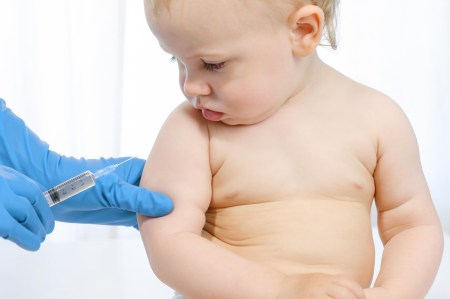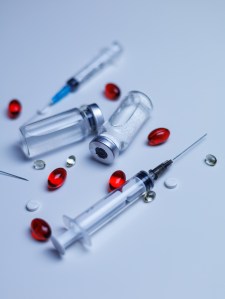
BE WISE, IMMUNIZE!
Get to know more about Immunization.
It’s Immunization Month and it’s also that time of the year when your kids are returning from their summer holidays and back to school! Dr Chaula Sangani, Specialist Paediatrician at HealthHub Clinics, Al Karama shares her insights on importance of immunization, good nutrition & timely check-ups.From vacation time to vaccination time!
At HealthHub Clinics, part of the focus on every child-wellness visit is on providing health visits at regular intervals, especially vaccination to combat illnesses. In addition to physical check-ups, our expert team of paediatricians will also review your child’s immunization records, and depending on the diagnosis, suggest the vaccines required. Yearly check-ups and immunizations are an absolute must to ensure normal development, healthy growth and protection from preventable diseases. Combined with essential nutrition and the amount of physical exercise required helps you protect your child from common and potentially severe diseases.
Yearly check-ups and immunizations are an absolute must to ensure normal development, healthy growth and protection from preventable diseases. Combined with essential nutrition and the amount of physical exercise required helps you protect your child from common and potentially severe diseases.
Facts on required vaccination to know:
According to the UNICEF, vaccination saves 2 to 3 million children every year from deadly diseases.
Lifesaving vaccines reach 45% of the world’s children under five years of age.
Over 23 million potential deaths have been averted between 2000 and 2018 through measles vaccinations.
Why are vaccines important?
Vaccines are one of the most profound advances in healthcare and an absolute boon in long term management of most illnesses having reduced polio, measles and smallpox throughout history. They have helped children grow and develop through good health, and studies show that vaccinated children perform better at school. But despite longstanding benefits, why is it that immunization levels continue to persist? The answer is a variety of factors that have come into play including pandemic disruptions and increasing vaccine misinformation. As a result, some 25 million children around the world are now missing out on life-saving vaccines every year, placing them at risk from life-threatening and entirely preventable diseases like measles and polio.Immunization according to WHO
According to the World Health Organization, immunization is a global health and development success story, saving millions of lives every year with doctors seriously looking at immunization schedules for children. It currently prevents nearly 5 million deaths every year from diseases like diphtheria, tetanus, influenza and measles. There are vaccines to prevent more than 20 life-threatening diseases, helping people of all ages live longer, healthier lives.
How do vaccines work?
Vaccines are a smart medical solution that works by introducing a weakened form of bacteria into our immune system, which in turn programs our bodies into building immunity against infectious diseases without causing illness. Our immune system is made up of special cells or antibodies that fight infection. We gain immunity against diseases either naturally by catching an illness or through immunization.

Are vaccines successful?
Perhaps the most magical quality about common vaccines is that they give us immunity without making us fall ill. They also protect people with a weak constitution who cannot be immunised such as very young children who really need child shots or those who can easily fall ill. When everyone within a country is vaccinated, it slows down the spread of the disease or stops it completely. The challenge is to ensure that the support of healthcare organizations and governments collaborate globally to work together to ensure that if enough people are vaccinated, any major outbreak of a disease will be contained.How long does it take for a vaccine to work?
When we receive a vaccine, our immune system gets to work immediately to create antibodies and memory cells to fight the infection. On an average, an immune response can take around 7 to 21 days. What’s important to note is that the duration of immunity can depend on several conditions, such as the nature of the vaccine, the timing of dosages, the age factor, and if we have had a natural infection.
Vaccinations for children in the UAE
If you’ve had a baby in the UAE, do take note that vaccinations for children are mandatory from the time of birth. The Ministry of Health and Prevention issues a vaccination card for children to record all the vaccines they have been given, and the date they were administered, which you would need to bring along to your child’s vaccination appointments.
If you’re a UAE resident, children’s vaccines are free until they turn five at government hospitals and clinics.
In the UAE, the routine childhood vaccination schedule goes as follows:
AT BIRTH
- BCG
- Hep.B (1st Dose)
2 MONTHS
- Hexavalent vaccine (DTaP, Hib, IPV (1st Dose) , Hep.B (2nd Dose))
- PCV (Pneumococcal conjugate Vaccine) (1st Dose)
- Rota virus vaccine (1st Dose)
4 MONTHS
- Hexavalent vaccine (DTaP, Hib, IPV (2nd Dose), Hep.B (3rd Dose))
- PCV (Pneumococcal conjugate Vaccine) (2nd Dose)
- Rota virus vaccine (2nd Dose)
6 MONTHS
- Pentavalent vaccine (DTP, Hib (3rd Dose), Hep.B (4th Dose))
- OPV (Oral Polio Vaccine)
- PCV (Pneumococcal conjugate Vaccine) (3rd Dose)
- Rota virus vaccine (3rd Dose)
12 MONTHS
- MMR (Mumps, Measles, Rubella) (1st Dose)
- Chicken Pox (Varicella vaccine 1st Dose)
18 MONTHS
- Pentaxim vaccine (DTaP, Hib, IPV) (4th Dose)
- OPV (Oral Polio Vaccine) (1st Booster Dose)
- MMR (Mumps, Measles, Rubella) (2nd Dose)
5-6 years
- DTaP (Diphtheria، acellular Pertussis، Tetanus) ،IPV) (5th dose)
- OPV (Oral Polio Vaccine) (2nd Booster Dose)
- Chicken Pox (Varicella vaccine 2nd Dose)
Vaccinations for special groups in the UAE
In addition to the mandatory immunizations, extra vaccines are recommended for certain individuals considered to be at higher risk of certain diseases:
- Pneumococcal Influenza Vaccine (PPSV): For those with diabetes, and chronic heart disease, chronic alcoholism, smoking, chronic renal failure, chronic liver disease, asplenia, transplant recipients and those undergoing immunosuppressant therapy
- Influenza: For healthcare personnel
- Hepatitis A: For those with chronic liver disease, and prison inmates and employees
- Hepatitis B: For those with chronic renal failure, healthcare personnel, and prison inmates and employees
- MMR: For healthcare personnel.
- Bone marrow transplant patients: Multiple doses of various vaccines from 12 months after their procedure.









